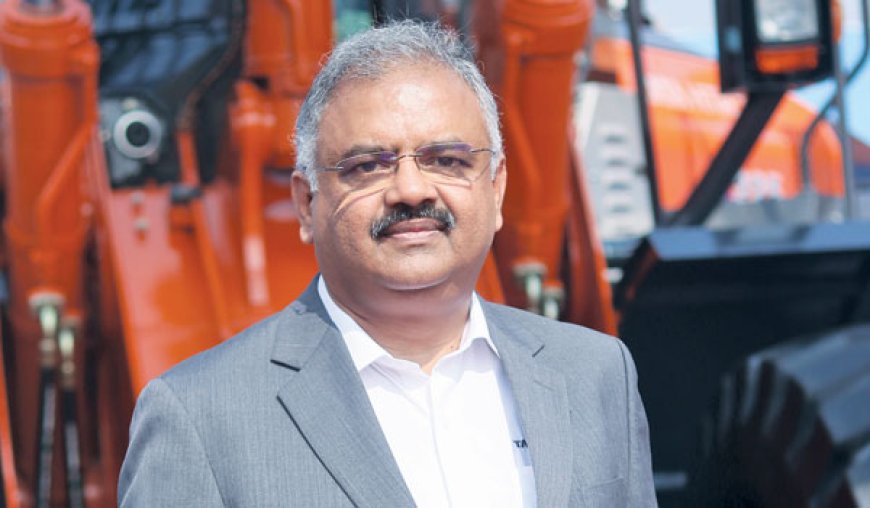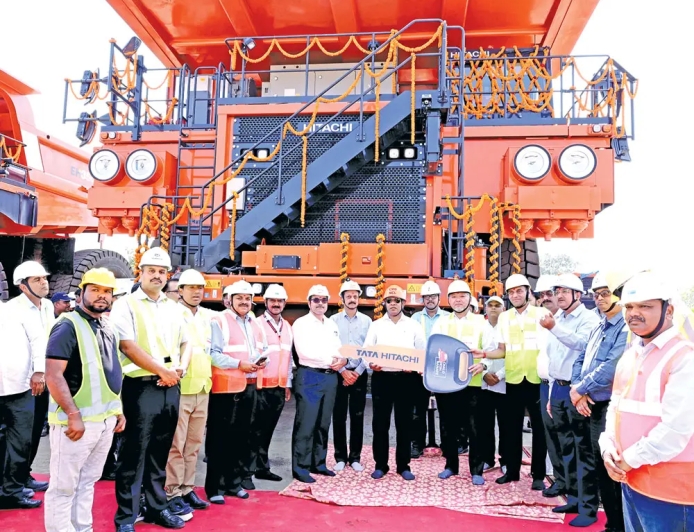The market shift towards electric construction equipment is driven by a combination of environmental, economic, technological, and regulatory factors.

What is your range of electric construction equipment produced?
As part of a commitment to combat global warming and promote the advancement of low-carbon societies, numerous companies in every sector are actively involved in a variety of initiatives aimed at developing sustainable products. In the construction equipment industry, significant development is underway in alternative energy sources such as hydrogen, biofuels, and battery power.
Our parent company, Hitachi Construction Machinery (HCM) in Japan, has led the way in electric excavator development. Hitachi Construction Machinery has pioneered electrical excavators ranging from 190 to 800Tonne, which have been operational globally for over two decades. This includes the remarkable EX 2600-6E, (260-tonne class excavator), which is actively deployed in Indian coal mines. These excavators are directly powered by electricity and AC motors are used as prime movers to operate the equipment.
Hitachi Construction Machinery offers high-capacity dump trucks in the 190-290Tonne class, equipped with AC drive technology utilizing AC motors to propel the trucks. Notably, a fleet of EH 3500AC-3 (190-Tonne dump truck), has been operating successfully in India, showcasing its technological superiority within the Indian mining sector. Moreover, Hitachi Construction Machinery further expanded its offerings by introducing battery-operated trucks utilizing AC drive technology.
Furthermore, within the compact excavator category, Hitachi Construction Machinery introduced innovative solutions featuring battery-powered models in 2, 5, 8 and 13Tonne, which were showcased during BAUMA 2022 in Munich, Germany. Also, the battery powered 5Tonne short radius excavator ZAXIS 55-6EB was on display during EXCON 2023 (India).
In response to the growing demand for more sustainable, eco-friendly and electric equipment, Tata Hitachi unveiled India’s first indigenously developed electric excavator (E Electric) prototype of 3Tonne mini excavator during EXCON 2023. The state-of-the-art machine (E-Electric) is a demonstration of the technical prowess of Tata Hitachi and our parent company Hitachi Construction Machinery (HCM) in addressing emergent market requirements and fulfilling our environmental obligations to ensure that development and progress do not come at the cost of a sustainable future for coming generations.
Going forward, we will continue to work toward the development of technologies and products for the creation of new values to contribute to solve environmental and customer challenges.
How do you perceive the market shift towards electric construction equipment?
The shift towards electric construction equipment reflects a broader trend in the construction equipment industry towards sustainability, efficiency, and innovation. Below stated are a few points related to this market / trend shift:
Environmental Concerns: With growing concerns about climate change and air pollution, industries face some pressure to shrink their carbon footprint. Electric construction equipment presents a cleaner substitute to conventional diesel-powered machinery, emitting zero pollutants during operation. This resonates with regulatory requirements and corporate sustainability objectives.
Cost Savings: Electric construction equipment can provide significant cost savings over the long term. While the initial investment may be higher than diesel-powered counterparts, electric machinery typically has lower operating costs due to cheaper electricity compared to diesel fuel. Additionally, electric equipment often requires less maintenance and has fewer moving parts, leading to reduced downtime and repair expenses.
Government Incentives and Regulations: Many governments around the world are implementing incentives and regulations to promote the adoption of electric vehicles and machines, including construction equipment. These policies can take the form of tax incentives, subsidies, or emissions regulations that favour electric or zero-emission machinery. Such measures further encourage the market shift towards electric construction equipment.
Charging Infrastructure: In India, the establishment of a robust charging network for electric construction equipment is still underway. While electric vehicle adoption is increasing, particularly in the automotive sector, the construction industry lags in charging station development for heavy-duty machinery. Accelerating the deployment of such infrastructure is crucial to support the growing demand for electric machines.
Overall, the market shift towards electric construction equipment is driven by a combination of environmental, economic, technological, and regulatory factors. As these trends continue to evolve, we can expect to see further innovation and investment in electric construction machinery.
How do you look at the reduced emissions and environmental impact through your electric machines?
Reduced emissions and environmental impact through our electric machine (E-Electric) represent a significant step forward in promoting sustainability within the construction industry. As we believe in sustainable tomorrow calls for being responsible today. Sharing are a few pointers below to support:
 Air Quality Improvement: By producing zero emissions during operation, Tata Hitachi’s E-Electric contributes directly to improving air quality. The reduction in emissions helps mitigate the negative health effects associated with pollutants such as nitrogen oxides (NOx) and particulate matter (PM).
Air Quality Improvement: By producing zero emissions during operation, Tata Hitachi’s E-Electric contributes directly to improving air quality. The reduction in emissions helps mitigate the negative health effects associated with pollutants such as nitrogen oxides (NOx) and particulate matter (PM).
Environmental Conservation: The use of electric excavators helps protect natural environments by minimizing pollution and resource consumption. Electric machines operate quietly and cleanly, with no risk of soil or water contamination, making them more compatible with environmentally sensitive areas.
Climate Change Mitigation: Electric excavators will play a vital role in mitigating climate change by reducing greenhouse gas emissions. By eliminating emissions, Tata Hitachi’s E-Electric machines will help reducing the construction sector’s carbon footprint and support efforts to combat climate change.
Regulations: Electric excavators align with increasingly stringent environmental regulations and emissions standards imposed by governments around the world. By investing in electric equipment, our customers can ensure compliance with these regulations.
Corporate Sustainability Goals: Since sustainability is at our core, adopting to Tata Hitachi’s E- Electric will allow our customers and companies to demonstrate their commitment to sustainability and CSR. Incorporating environmentally friendly practices into their operations not only benefits the environment but also enhances the company’s reputation. Overall, the reduced emissions and environmental impact achieved through Tata Hitachi’s electric machine represent a positive step towards a more environmentally responsible construction industry.
Forecasts for future developments or trends in the electric construction equipment sector
Forecasting the future developments and trends in the electric construction equipment sector involves considering various factors shaping the industry like:
Advancements in Battery Technology: Expecting continuous advancements in battery technology, including improvements in energy density, charging speed, charging infrastructure and lifespan. These advancements will enable electric construction equipment to achieve longer operating times and faster recharge cycles, making them more practical and efficient for a wider range of applications.
Expansion of Product Offerings: We can anticipate a broader range of electric construction equipment offerings from various manufacturers as they respond to increasing demand and technological advancements. This expansion may include electric variants of various machinery types, including excavators, loaders, dump trucks, cranes, and compactors, catering to diverse construction needs.
Integration of Smart Technologies: Looking forward for the integration of smart technologies into electric construction equipment, enabling features such as remote monitoring, predictive maintenance, autonomous operation, and real-time data analytics. These technologies will enhance equipment performance, efficiency, and safety while providing valuable insights for operators and customers.
Infrastructure Development: We can expect an increase in investment in charging infrastructure and support services for electric construction equipment. This includes the establishment of charging stations at construction sites, depots, and strategic locations, as well as the development of maintenance and support networks specialized for electric machinery.
Regulatory Support and Incentives: Currently governments worldwide are likely to introduce further regulations and incentives to promote the adoption of electric construction equipment. This may include emissions standards, tax incentives, subsidies, and procurement policies favouring electric or zero-emission machinery, driving market growth and adoption.
Market Adoption and Growth: Foreseeing an acceleration in adoption of electric construction equipment by construction companies and other customers, driven by cost savings, environmental benefits, regulatory compliance, and market demand. As the industry becomes more familiar with electric technology and its advantages, electric machinery will increasingly become the preferred choice for future potential customers.
Overall, the future of the electric construction equipment sector is promising, with significant opportunities for innovation, growth, and sustainability.
What is your vision for the industry’s future of electric construction equipment?
Perspective on potential future scenarios for the electric construction equipment industry based on trends and forecasts. In near future, Tata Hitachi envision the electric construction equipment industry continuing to grow and evolve, driven by several key factors:
Rapid Technological Advancements: As we are foreseeing continuous advancements in battery technology, electric drivetrains, and smart technologies leading to more efficient, powerful, and versatile electric construction equipment. These advancements will enable electric construction equipment to match or exceed the performance of traditional equipment across a wide range of applications.
Increased Adoption and Market Penetration: It is anticipated that a significant increase in the adoption of electric construction equipment will be there by construction companies worldwide. Factors such as stricter emissions regulations, rising fuel costs, and growing environmental awareness will drive this demand for electric machinery, leading to higher market penetration.








